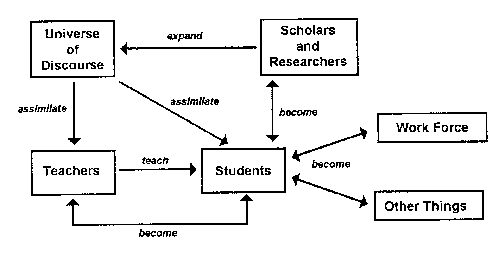
 |
||||


Some of the other important commodities which relate intimately to the ways in which we acquire and structure knowledge as a result of our perceptual and cognitive processes include signals, data, information, meta-knowledge and wisdom. Each of these items plays an important role in the intricate tasks involved in observing, recording and monitoring events and happenings and of disseminating and communicating to others the knowledge that is derived from these processes. Obviously, the basic activities referred to above form the fundamental foundations of a generic class of systems that are commonly referred to as 'knowledge transfer systems' (Barker, 1994).
Within the context of education and training, the basic model that we propose for knowledge transfer is illustrated schematically in figure 1. This shows how scholars and researchers within a particular subject domain create new knowledge and, in so doing, cause an expansion in the Universe of Discourse relating to that subject. In order to ensure that this new knowledge gets passed across to new generations we have created various sorts of educational system. Within these systems 'teachers' usually have to assimilate a subset of this knowledge and then 'teach' it to students. Through the acquisition of this knowledge, students become new scholars and researchers (thereby propagating the cycle), an informed society and a skilful and competitive workforce. Unfortunately, formal education in most countries ceases after the onset of adult life. As a consequence of this, there is a vast industry developing in the area of post-compulsory education - be this for the support of leisure activities, entertainment purposes or for career development and enhancement.
Within the context of both conventional and post-compulsory education we propose that 'electronic course delivery' has much to offer in terms of the efficiency and effectiveness of knowledge transfer - as depicted in figure 1. Furthermore, it is our contention that this approach can form a sound basis for the realisation of an ongoing 'learning society' that is supported by a flexible and dynamic approach to knowledge dissemination through the creation of a new type of organisation which we refer to as the 'virtual university'. We envisage such an organisation providing an infrastructure to support both conventional approaches to education and ongoing 'on-the-job' learning and training activities within industrial and commercial settings.

Bearing in mind what has been said above, the remainder of this paper outlines the basic requirements of a system to support electronic course delivery through the development of appropriate course materials that are delivered by various electronic means - such as electronic books, online lectures and computer conversations of various sorts. We also outline how the creation of appropriately designed electronic performance support systems can be used to facilitate ongoing learning and training activities within both academic and non-academic settings. Finally, in the concluding part of the paper we discuss how these resources can be integrated in various ways to meet the requirements of a versatile and comprehensive future learning society based upon global knowledge sharing.


Graphics Multimedia Virtual Environments Visualisation Contents